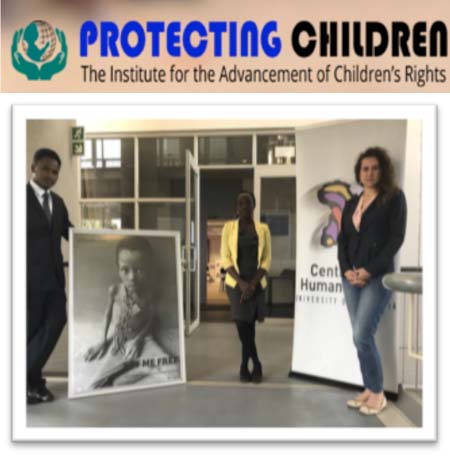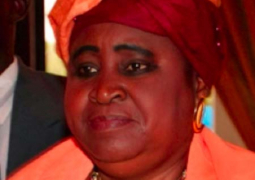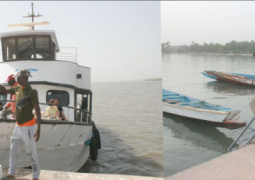
Child’s
Rights
In
this article, in our quest to know who is a child, we will attempt to answer
the following questions within the context of the law.
Now
let’s look at this:-
• Who is a child?
• What are children’s rights?
• Why child protection?
In
our attempt to understand the first question, who is a child?
A
child, (the plural of children), biologically is a human being between the
stages of birth and puberty.
The
legal definition of child generally refers to a minor, otherwise known as a
person younger than the age of majority.
However,
according to the Criminal Code, a child is any person under the age of eighteen
years. This is also reiterated in the Children’s Act 2005 – “child” means a
person under the age of eighteen years. Also the Convention on the Rights of
the Child (C.R.C), of 1989 defines a child as any human person who has not
reached the age of 18 years.
Children’s
rights are the human rights of children with particular attention to the rights
of special protection and care afforded to minors. Though, Human Rights apply
to all age groups, while children have the same general human rights as adults,
but children’s rights belong to only that vulnerable segment of the society.
Now
let’s have a look at “The Ten Core Rights of the United Nations’ Declaration on
the Rights of a Child, are as follows:-
1)
The Right to affection, love and understanding
2)
The Right to adequate nutrition and medical care
3)
The Right to free medical care
4)
The Right to full opportunity for play and recreation
5)
The Right to a name and nationality
6)
The Right to special care, if handicapped
7)
The Right to be among the first to receive relief in times of disaster
8)
The Right to be useful member of society and to develop individual abilities
9)
The Right to be brought up in a spirit of peace and universal brotherhood
10)
The Right to enjoy these rights, regardless of race, color, sex, religion,
national or social origin.
These
rights are pretty much the same rights captured in the Constitution, and
embodied in the Children’s Act 2005, underpinned by the welfare principle of
“the best interest of the child”. Now a look at the provisions under the Act,
is a whole regime of rights, so we will focus on those that concerns us for the
moment. According to part 2 of the Act:-
“Sections
5 – In addition to the rights guaranteed under Chapter IV of the Constitution
of the Republic of The Gambia, every child has the right set out in this part.
Every
child has the right to survival and development.
Every
child has the right to a name and, accordingly, shall be given a name on his or
her birth or on such other date as is dictated by the culture of his or her
parents or guardians.
The
birth of every child shall be registered in accordance with the provisions of
the relevant law.
Every
child has a right to acquire a nationality.
Right
to health and health services, to enjoy the best attainable state of physical
and mental health.
Right
to privacy, this include unlawful interference with his or her privacy, family
life, home, correspondence, or to attacks on his or her honor or reputation.
However, nothing in this provision affects the rights of parents and guardians,
to exercise reasonable supervision and control over the conduct of their
children and wards.
Also
every child has a right to enjoy parental care and protection and shall,
whenever possible, have the right to reside with his or her parents.
Now
the answer to the last question, why child protection? We don’t have to look
far for the answers simply because every adults has a history of childhood, but
not every child has a history of adulthood. Remember someone that we called,
father, mother, uncle, aunty, or guardian etc. was there for us, so is our turn
to be there for others. In fact we need to protect the young ones for the sake
of posterity, for the continued existence of mankind; as is the importance of
productivity to human existence.
Now
some of these rights are sacrosanct to the person of the child, inalienable to
these rights are the responsibilities that come with it. As the Constitution
rightly put it in this way under Section 220 – duties of a citizen – “the
exercise and enjoyment of rights and freedom are inseparable from the
performance of duties and obligations…”
Now
from the above, let’s look at the other side of the equation, as to what the
child in turn can give back, has to give back or “must” give back, mandatory as
a qualifier. Also base on the old adage that “to whom much is given much is
expected”.
So
every child has responsibility towards his or her family and society, The
Gambia, and other legally recognized national and international communities.
As
long as the society is concern there is no free lunch anywhere so the child has
to give back as required by the law, religion and ordinary common sense.
It
is the duty of a child, subject to his or her age and ability and such other
limitations as may be contained in this Act and any other law, to –
“(a)
work for the cohesion of his or her family;
(b)
respect his or her parents, superiors and elders at all times and assist them,
where necessary;
(c)
subject to section 59, serve The Gambia by placing his or her physical and
intellectual abilities at its service;
(d)
preserve and strengthen African and, in particular, Gambian, cultural values in
his or her relations with other members of the society, in the spirit of
tolerance, dialogue and consultation;
(e)
contribute to the moral well-being of the society;
(f)
preserve and strengthen social and national solidarity;
(g)
preserve and strengthen the independence and integrity of The Gambia;
(h)
respect the ideals of freedom, equality, humanness and justice for all persons;
and
(I)
contribute to the best of his or her abilities, at all times and at all levels,
to the promotion and achievement of African unity”.
Interestingly,
in this last provision, is the indoctrination of African unity in the young
ones is a good step in the right direction, the insemination of African
integration and African values at the rudimentary stage of childhood is of
paramount importance.
Also
subsection (c), pointed section 59, which provides for an exception as to the
kind of services that a child can offer. It states:-
“(1)
A child shall not be recruited into any of the branches of the armed forces of
The Gambia or other security agencies.
(2)
The Government or any other relevant agency or body shall ensure that no child
is directly involved in any military operations or hostilities.”
Finally,
now the missing piece on the jig saw is the parent, under the law what the
parents have to offer by virtue of Section 22 of the Children’s Act 2005, are
these:-
“(1)
Parents have the primary responsibility for the upbringing and development of
their child and have the duty to –
(a) ensure that the best interest of the
child are their basic concerns at all times;
(b) secure, within their abilities and
financial capabilities, conditions of living necessary to the child’s development;
and
(c) ensure that domestic discipline is
administered with humanity and in a manner consistent with the inherent dignity
of the child.
(2)
Where the biological parents of a child are deceased, parental responsibility
may pass on to guardians or relatives of either parents or, by way of a care
order, to the manager of a residential care home, or to a foster parents or a
significant other.
“Significant
other” means a person who has a close relationship with the child or with
either of his or her parents.”That brought us to the end of this discussion.
Good
day folks. May the law guide you!
Author
Kawsu Jadama
(I.A.C.R)
Volunteer.




